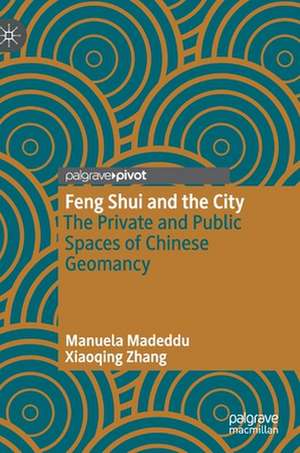Feng Shui and the City: The Private and Public Spaces of Chinese Geomancy
Autor Manuela Madeddu, Xiaoqing Zhangen Limba Engleză Hardback – 20 apr 2021
Preț: 419.06 lei
Nou
Puncte Express: 629
Preț estimativ în valută:
80.18€ • 83.95$ • 66.35£
80.18€ • 83.95$ • 66.35£
Carte tipărită la comandă
Livrare economică 05-19 aprilie
Preluare comenzi: 021 569.72.76
Specificații
ISBN-13: 9789811608469
ISBN-10: 9811608466
Pagini: 158
Ilustrații: XV, 158 p. 23 illus., 16 illus. in color.
Dimensiuni: 148 x 210 mm
Greutate: 0.36 kg
Ediția:1st ed. 2021
Editura: Springer Nature Singapore
Colecția Palgrave Pivot
Locul publicării:Singapore, Singapore
ISBN-10: 9811608466
Pagini: 158
Ilustrații: XV, 158 p. 23 illus., 16 illus. in color.
Dimensiuni: 148 x 210 mm
Greutate: 0.36 kg
Ediția:1st ed. 2021
Editura: Springer Nature Singapore
Colecția Palgrave Pivot
Locul publicării:Singapore, Singapore
Cuprins
Chapter 1: Feng Shui and the ‘Meaning of Space’.- Chapter 2: The Case Studies and Research Approach.- Chapter 3: Feng Shui in Mainland China – Guangdong Province.- Chapter 4: Feng Shui in the Chinese territories – Hong Kong.- Chapter 5: Conclusions.
Notă biografică
Manuela Madeddu is Senior Lecturer in Urban Design at the University of Liverpool. She has held previous posts at London South Bank University and the Politecnico di Torino, and practised as an architect and urban designer in Italy and the UK. Her research focuses on cultures of design and regulation.
Xiaoqing Zhang is Lecturer in Public Administration at the Zhejiang Sci-Tech University. She graduated from University College London with a PhD in Planning Studies. Her research interests include urban regeneration in relation to welfare regimes, and community governance sitting within a broader understanding of local political resources.
Textul de pe ultima copertă
‘...A vital contribution to the study of Feng Shui in contemporary urban areas, providing a theoretically and empirically rich rendering of the many lives of an ancient practice as it evolves to serve the needs and interests of a variety of players swept up in enormous political and economic changes…The writing is clear, concise, and economical—a joy to read. The book constitutes an important contribution to the literature on Feng Shui in contemporary societies and it introduces findings that are broadly applicable. It will be widely cited for some time to come.’
—Professor Chris Coggins, Bard College at Simon’s Rock/Open Society University Network
Feng Shui and the City analyses the past and contemporary influences of traditional geomancy on Chinese built environments across three domains: domestic spaces, spaces of commercial development and the public realm. Using Lefebvre’s notion of absolute and abstract space—spaces of ‘symbolic existence’ and ‘everyday life’ versus spaces of domination and control, it tracks evolving attachment to, and use of, Feng Shui in Guangdong and Hong Kong. The book seeks to understand the changing role of Feng Shui in modern urban development and its regulation, and to question what constitutes authentic Feng Shui today.
Manuela Madeddu is Senior Lecturer in Urban Design at the University of Liverpool. She has held previous posts at London South Bank University and the Politecnico di Torino, and practised as an architect and urban designer in Italy and the UK. Her research focuses on cultures of design and regulation.
Xiaoqing Zhang is Lecturer in Public Administration at the Zhejiang Sci-Tech University. She graduated from University College London with a PhD in Planning Studies. Her research interests include urban regeneration in relation to welfare regimes, and community governance sitting within a broader understanding of local political resources.
Caracteristici
Advances the research on the impact of Feng Shui on the built environment by focusing on its pervasiveness on contemporary urban planning and design processes and outputs Provides detailed case studies of Feng Shui’s influence on the built environment in both mainland China (Guangdong province) and the Chinese territories (Hong Kong) Explores the narratives underpinning Feng Shui’s contemporary practices in both mainland China and the Chinese territories Considers Feng Shui as a means through which social and cultural values are transposed onto urban and architectural space
